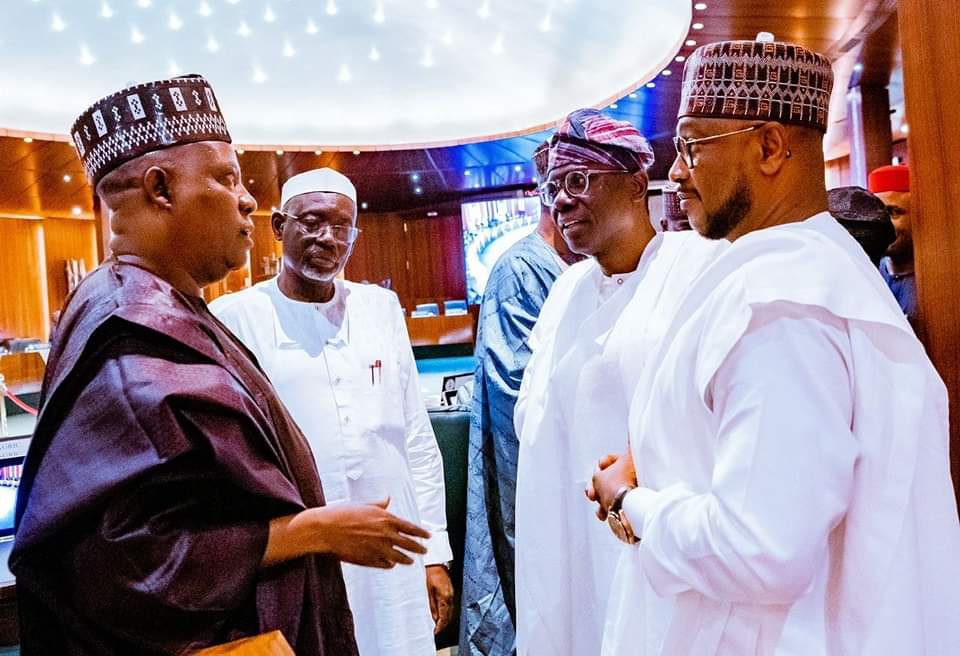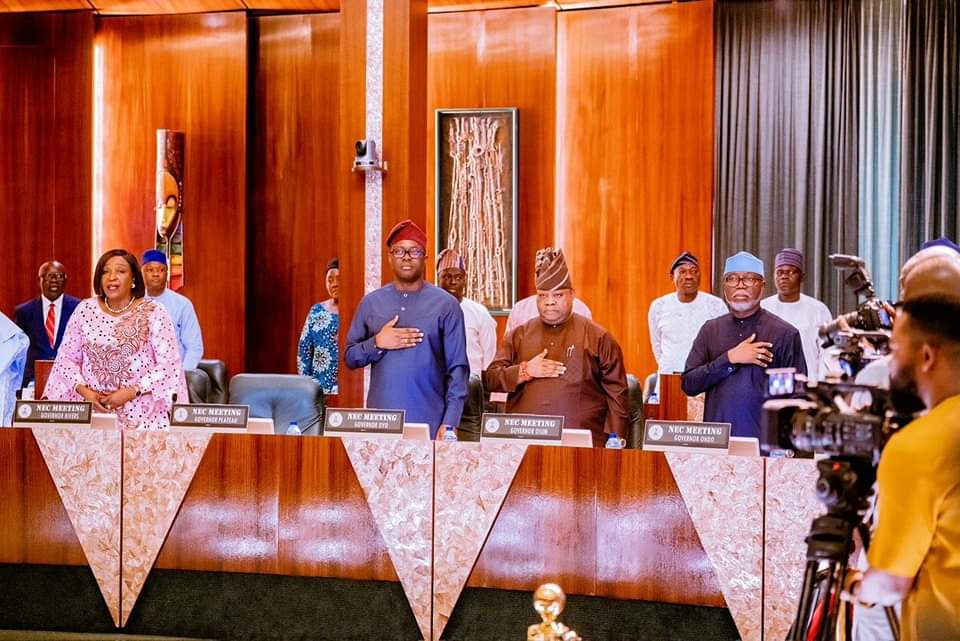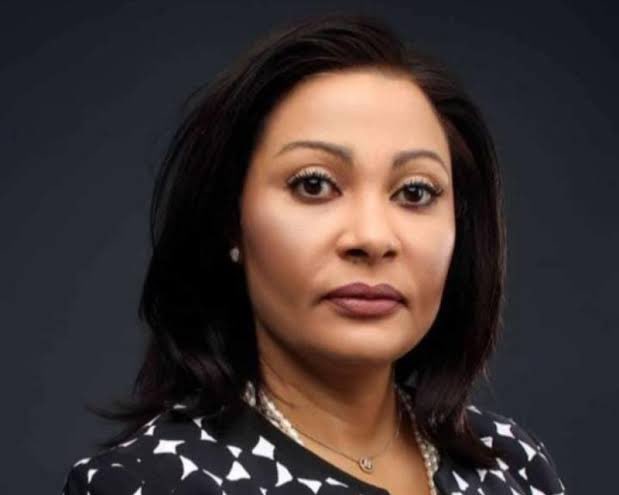FG APPROVES N5B SUBSIDY PAIN RELIEF FOR EACH STATES

.
The National Economic Council (NEC) jas approved the release of N5 billion each to the 36 states.
Acoording to the Nation newspaper, the money is to be used to buy rice, maize and fertilisers for farmers.It will cover other measures as may be deemed necessary by the governments.The money is partly a grant and a loan from the Federal Government.Yesterday’s NEC meeting at Aso Villa was presided over by its chairman, Vice President Kashim Shettima.
Last month, another tranche of N5billion each was approved to be shared by states. Only N2 billion out of these had been received, according to Kaduna State Governor Uba Sani.
Some of the governors spoke to reporters on the outcome of yesterday’s meeting.
These are: Babagana Zulum (Borno), Yahaya Bello (Kogi), Charles Soludo (Anambra), Seyi Makinde (Oyo) and Sani.
The governors agreed to share the World Bank’s $800 million fund through cash transfers to the poor.
They also agreed that a negotiation panel should interface with Labour to resolve the conflict arising from fuel subsidy removal.
Zulum said: “NEC expressed serious concerns as regards increasing cost of food items, increasing cost of transportation, among others, as a result of subsidy removal.
“To cushion the effect of subsidy removal, the Federal Government last week released five trucks of rice to each state.
“Furthermore, to cushion the effect of food shortages across the country, the Federal Government has approved the sum of N5billion to be given to each state for the procurement of 100,000 bags of rice, 40,000 bags of maize and fertilizers.
“This funding has to be shared with a formula as follows: 52 per cent of this money is given to states as grants, while 48 per cent of the N5billon is to be paid back on an instalment basis within a period of 20 months to the CBN by the states and the local governments.
“The Council commended the efforts of the Federal Government under the leadership of President Bola Ahmed Tinubu as well as the CBN.

“We have also commended the efforts of NEMA (National Emergency Management Agency) in cushioning the effects of the subsidy removal.
“Council has taken bold decisions to ensure speedy release of grains and other items to cushion the effects of subsidy removal on the less privileged in the society.”
Zulum added that NEC insisted that the Federal Government should deploy the $800 million loan from the World Bank the way it was initially planned – through conditional cash transfers, using the registers to be provided by the states.
The Borno governor said aside from mitigating the immediate effects of subsidy removal through food reliefs, the Council took notice of the Federal Government’s wider plan to deploy the N500 billion approved by the National Assembly towards strengthening agriculture, transportation and industry.
Zulum said: “Furthermore, Council has also noted the package that was announced by the President to cushion the effect of subsidy removal, amounting to about N500billion.
“This fund has to be distributed to MSMEs and the industrial sector. About N125 billion will go to cash transfers, the agricultural sector as well as gas expansion for buses.
“Because of the increasing cost of fossil fuel, the Federal Government intends to establish more gas stations in Nigeria, procure more gas-powered buses, compressed natural gas (CNG) buses, as well as electric buses to cushion the effect of the subsidy removal.”
He said the NEC agreed that the frontier states bordering the Niger Republic are to be assisted with more palliative materials than other states, considering the influx of refugees into their domains from the beleaguered neighbouring country.
He added that the Council set up a committee, consisting of the Chairman of the Nigerian Governors Forum (NGF) Abdulrahaman Abdulrazaq, Soludo and others to interface with the Labour on the current situation.
“Furthermore, NEMA will also liaise with states to distribute foodstuffs to the people immediately, especially those affected in the frontline states that are bordering Niger Republic because of influx of refugees.
“The Council has also tasked the states to dialogue with the Labour unions’ leadership.
“All these palliatives are temporary solutions. Council has decided to invest in medium and longer-term sustainable solutions that will ensure availability of food and non-food solutions in Nigeria, especially investing in commercial agriculture and also investing in irrigated agriculture.
“NEC is calling on Nigerians and Labour to be calm and law-abiding as the President is determined to address the issues at hand.”
Soludo said the review of the social register was in progress.
He said influx of refugees from Niger Republic has affected the distribution of palliatives.
Sani said only N2 billion has so far been given to states out of the approved N5 billion.
Bello: flood impact reports awaited from 15 states
Bello said a sub-committee was constituted last year to propose modalities to address the imminent food crisis due to flooding.
He said: “The Sub-committee was to be chaired by the Executive Governor of Kebbi State and the following as members: ministries of agriculture, humanitarian and disaster management, finance, NEMA and CBN.
“NEC Secretariat is to develop and forward a template with an accompanying letter to all the affected states to collect data on a preliminary assessment of the impact of the flood in the affected communities, harmonise the data and produce report of their findings to the Committee.
“The exercise would have been more successful and effective if all the affected states had responded as and when due and according to provisions made in the template. Some of the limitations include the delay or non-submission of filled templates by some states.
“Only 16 of the total number of affected states forwarded their submissions to the NEC Secretariat to date as expected. About 15 others were yet to do so. The submission from defaulting states are awaited to update the database.
“Some of the states that submitted did not fully comply with requisitions of the template thereby making some of their submissions difficult to process by the automated system.
“There is the need for compliance with laid down processes to allow for a higher degree of uniformity, especially considering the huge volume of data involved.
“Only a few states reached out to the Council Secretariat’s Technical Team for possible guidance and assistance in the exercise. States are encouraged to take advantage of the Secretariat’s personnel to address important concerns where necessary.
“Only a few states indicated financial implications for the damage caused, thereby making it difficult to propose a required amount of intervention.
“The NEC said the plight of victims of flood across the affected states can be alleviated if the intervention from the Federal Government materialized without further delay.”
Makinde said the Director-General of Nigeria Economic Summit Group (NESG) made a presentation on how to explore a NEC Agenda for macro-economics stability and shared prosperity.
The Oyo governor said NESG suggested how to achieve low inflation and stimulate growth and macroeconomic objectives.
He explained that the objectives of macroeconomic stability are a high and stable economy, low inflation growth price level, unemployment account, favourable current low balance and stable exchange rate account balance.
Makinde noted that the current macroeconomics landscape showed that investment inflows have dwindled since 2019.
He added that the investment/GDP ratio, crude oil exports and refined petroleum products imports dominate Nigeria’s trade structure.





